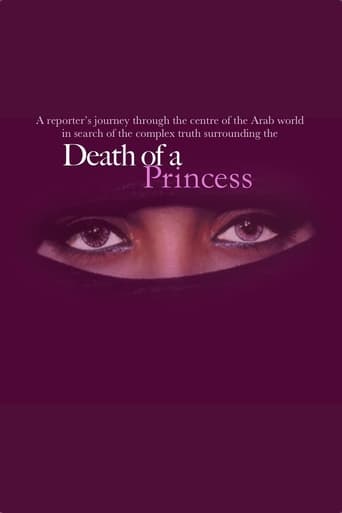CDC0805
When I first saw this docudrama in 1980, I was intrigued by the story. I was very much surprised that the Saudi government made an issue of this film. In essence, what goes in their country stays in their country.I will agree that keeping internal matters is a private affair for a country. However, I will also agree that we can disagree in what goes on in that country.Saudi Arabia is telling us to mind our own business when it comes to the moral affairs within that kingdom. But, Saudi Arabia should mind its own business in telling us -- the Western world -- how to conduct ourselves when it comes to freedom of expression.If there is a story to be told, then we will tell it.
charlene-good
I waited 25 years to see this documentary. Producers Antony Thomas and David Fanning did a wonderful job piecing all the parts of the puzzle together about Death of a Princess. After 25 years, PBS finally rebroadcast the film on April 19, 2005. Way too long a wait! Little has changed in the life of a Saudi woman since 1980. She must still obtain permission to travel, attend school, and is not permitted to drive a car. Even extending a pleasant "hello" to an unknown male is forbidden. I believe Princess Misha was trying to prove a point. Unfortunately, she lost her life trying to gain be independent. It is unfortunate that she was stoned to death. Yes, I said stoned to death - she was not shot. Her boyfriend was beheaded. How sad! Even after 25 years, from her unmarked desert grave she cries out for justice. Women of Saudi Arabia need to unite against oppression and male dominance. It amazes me that she was murdered on the orders of her grandfather. I thought "family" is an important aspect of Saudi life. Apparently, because she is a woman, that didn't matter. This documentary should be made into a movie for the big screen. Hollywood, take notice!
digidoo
Apparently the first time this excellent British-American docudrama was scheduled to be shown on PBS (way back in 1980) it met with an outcry of protestation from the Saudi Royal Family. It also met with an equally vociferous outcry from many Senators Congressmen and senior level diplomats within the Regan administration. Then acting Secretary of State Warren Christopher wrote a letter to then PBS president Lawrence Grossman, a letter which Christopher also simultaneously had released to the press, urging PBS to "reevaluate" its decision to broadcast the program, given the subject's "potential damage to our relations with an important ally." Very real pressure was also brought to bear by Mobil Oil, PBS's chief underwriter for many of its programs, when they very publicly urged the public broadcaster to not broadcast the program because it would reflect badly on Saudi life. The seed of fear was also planted that perhaps the Saudis would shut off the nation's oil supply leading to severe economic ramifications. To PBS's credit, they didn't back down. PBS has now revisited this 1980's program some 25 years later and it has just as much impact today as it did back then. Perhaps even more so, given the US's gentle treatment of Saudi Arabia post 9/11 and the US's use of the oldest sleight of hand trick in the book, the art of misdirection. Our "liberation" of Iraq and our colonial aspirations there have now resulted in a more fractious and radical Islamic state then the secular nation that existed before it...But of course, one we can control. (And yes Saddam Hussein was an evil dictator and I'm glad that he's gone, but that doesn't change the facts). This is a thoughtful and engrossing film and shows how things really haven't changed much for woman living in The Kingdom (Saudi Arabia). Like those hijacked planes that slammed into the WTC towers, the 'true' Islam faith was hijacked by an odd assortment of repressive and paranoiac men many years ago... and their actions are still resonating today.
gar714
What struck me most was how little has changed, here and there. Twenty-five years ago I was living in Birmingham, AL. I was aware of the program only because of the ads against it and some mild coverage in the local press about the decision of the local PBS station's decision not to air the program. Apparently, there was enough Saudi money within our local community that put enough pressure on our own PBS station to pull the plug. Anyway, the concepts and ideas in this presentation still stand the test of time. If anything, they foreshadow what has taken place all these years later. All faiths and religions are corrupted by fundamentalist interpretations. The MSM is even more vulnerable to corruption than that PBS affiliate was all those years ago.One thing that has changed is that I am now a proud citizen of New York City and I finally got to see it on Frontline. I have to wonder if Birmingham was finally lucky as well.



